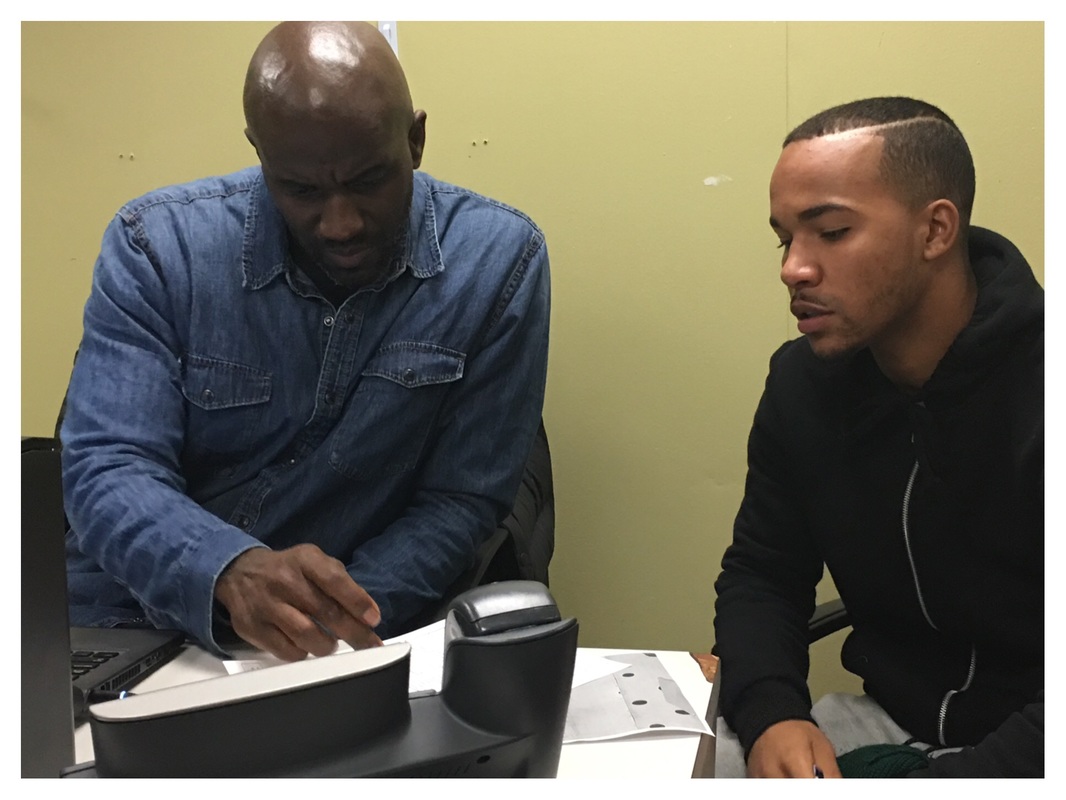
Donovan Jermayne Evans leans into his computer screen double-checking his answer to a question. He is one of a baker’s dozen of students enrolled in the Project Success Academy at Lithia Springs High School near Atlanta, Georgia. He and his Academy-mates are each completing coursework to earn a high school diploma. While many current Project Success Academy students might be seen as seniors because of their ages; they lack the credits to graduate and are classified as eleventh, tenth, and even ninth graders.
Evans, who turns 20 this month, has had no problem understanding school work. That isn’t difficult for him; however, “attending” school is where he has fallen short. He didn’t like coming to school, and by the time he was in middle school, he had been charged with truancy many times. When he reflects on those years, Evans says, “school just wasn’t for me”. He described the challenge of fitting in and navigating between the two worlds of school and home. The “otherness” he experienced as a biracial teen only magnified matters. Despite all of this, he is determined to be the first on his father's side of the family to graduate high school.
Evans is one of many students who are forgotten, discouraged, left out, or who otherwise “fall through the cracks” in the American educational system. According to researchers who published their findings in “Unfulfilled Promise: The Dimensions and Characteristics of Philadelphia’s dropout crisis,” Evans and students like him have a 75% chance of dropping out of high school. The researchers used age, grades, and attendance to predict which eighth and ninth grade students would drop out. Eighty percent of those they predicted would drop out of high school eventually did.
Nationally, high school dropouts experience poverty at a rate twice as high as college graduates. Students who don’t earn a high school diploma are also more likely to engage in risky behaviors. These behaviors are often gateways to the prison industrial complex. In fact, high school dropouts make up over 80 percent of the people who are currently incarcerated. Choices for high school dropouts are limited as two years of college has replaced getting a high school diploma as the first step to earning enough to support a family. The average annual income of students who do not receive a high school diploma is $20,241 according to the U.S. Census Bureau. It is roughly $31,000 for high school graduates. In the face of these and other statistics, Evans has completed his high school graduation requirements before he heads home for winter break. It’s his early Christmas gift to his three-year-old daughter, his father, and his supportive mother.
Evans recalls the tragic deaths of two of his friends and his decision to acquire a gun for his own protection. It is a decision he regrets because his life took a turn for the worst. The gun he purchased had been used by others in criminal activity. Soon after, crimes he did not commit were being pinned to him because he was in possession of the weapon. The time he spent behind bars was brief. It was long enough; however, to get his attention and help him focus on important matters like providing for his daughter, deepening his faith, and completing high school.
He came to Lithia Springs High School determined to succeed. Once on campus, Evans encountered a few adults who looked down on him. He thinks his poor decision-making and incarceration were to blame. He says he felt like some of them wanted him to disappear and dropout. That is when he met Mr. Terence Dillard, the Project Success Academy facilitator. Dillard is no-nonsense and is “always about the work” according to Evans and his classmates. Having adults who believe in them and who do not give up on them--even when their actions and attitudes would suggest otherwise--is a great strategy for disrupting the steady stream of high school dropouts. In one small scale study, ⅔ of high school dropouts said they would have worked harder and graduated if their teachers had believed in them and maintained higher expectations.
Dillard’s impact is local; yet, far-reaching and global. His class typically has 15 students. Each year he gets two or three unlikely students to achieve their dreams of graduating. While these numbers might seem insignificant at first, the significance of earning a high school diploma shapes his students lives forever. Several reports and studies have noted that students who graduate high school are more likely to be contributors to our nation’s economy than those who drop out. Students who do not graduate high school are more likely to earn less over a lifetime (at least $375,000 less) than those who graduate.
According to the Alliance for Excellent Education, if 90% of the students from the Class of 2012 had graduated (instead of the 73% who did), the results would have had an ongoing economic impact on the United States of America for decades. There would have been $8.1 billion in increased earnings each year and $1.3 billion in increased annual federal tax revenue.
According to Dr. Rodney L. Boone, whose research focuses on culturally relevant pedagogy, Dillard is his students’ hero. “There is a special category of teachers who serve our students by validating and affirming their greatness through culturally relevant educational opportunities. These Teacher Heroes or ‘Teroes’ learn how to expose and motivate their students to pursue excellence despite the challenges they experience. Mr. Dillard is a Tero who devotes time, energy, and skills to help his students discover their potential and graduate high school. His determination and dedication come from supporting students often labeled ‘at risk’. Mr. Dillard’s quiet tenacity removes obstacles. He is a barrier breaker”. For Dillard, it is just what he does without fanfare, one student at a time. “I ask each student one question, ‘Is this what you want to do?’ and then I work with them to meet every challenge,” he says.
A career educator, Dillard effectively blends roles from teacher and big brother to mentor and Success Coach to help his students experience success after success which ends in graduation. Evans notes that Dillard provided encouragement and structure. He links his success to a combination of four D’s: decision-making, determination, dedication, and Dillard. “He stayed on me because I told him I wanted to be the first to graduate and break the cycle. [He’s] a blessing,” says Evans, “God didn't have to put Mr. Dillard in my life to help me graduate.”
Evans, who turns 20 this month, has had no problem understanding school work. That isn’t difficult for him; however, “attending” school is where he has fallen short. He didn’t like coming to school, and by the time he was in middle school, he had been charged with truancy many times. When he reflects on those years, Evans says, “school just wasn’t for me”. He described the challenge of fitting in and navigating between the two worlds of school and home. The “otherness” he experienced as a biracial teen only magnified matters. Despite all of this, he is determined to be the first on his father's side of the family to graduate high school.
Evans is one of many students who are forgotten, discouraged, left out, or who otherwise “fall through the cracks” in the American educational system. According to researchers who published their findings in “Unfulfilled Promise: The Dimensions and Characteristics of Philadelphia’s dropout crisis,” Evans and students like him have a 75% chance of dropping out of high school. The researchers used age, grades, and attendance to predict which eighth and ninth grade students would drop out. Eighty percent of those they predicted would drop out of high school eventually did.
Nationally, high school dropouts experience poverty at a rate twice as high as college graduates. Students who don’t earn a high school diploma are also more likely to engage in risky behaviors. These behaviors are often gateways to the prison industrial complex. In fact, high school dropouts make up over 80 percent of the people who are currently incarcerated. Choices for high school dropouts are limited as two years of college has replaced getting a high school diploma as the first step to earning enough to support a family. The average annual income of students who do not receive a high school diploma is $20,241 according to the U.S. Census Bureau. It is roughly $31,000 for high school graduates. In the face of these and other statistics, Evans has completed his high school graduation requirements before he heads home for winter break. It’s his early Christmas gift to his three-year-old daughter, his father, and his supportive mother.
Evans recalls the tragic deaths of two of his friends and his decision to acquire a gun for his own protection. It is a decision he regrets because his life took a turn for the worst. The gun he purchased had been used by others in criminal activity. Soon after, crimes he did not commit were being pinned to him because he was in possession of the weapon. The time he spent behind bars was brief. It was long enough; however, to get his attention and help him focus on important matters like providing for his daughter, deepening his faith, and completing high school.
He came to Lithia Springs High School determined to succeed. Once on campus, Evans encountered a few adults who looked down on him. He thinks his poor decision-making and incarceration were to blame. He says he felt like some of them wanted him to disappear and dropout. That is when he met Mr. Terence Dillard, the Project Success Academy facilitator. Dillard is no-nonsense and is “always about the work” according to Evans and his classmates. Having adults who believe in them and who do not give up on them--even when their actions and attitudes would suggest otherwise--is a great strategy for disrupting the steady stream of high school dropouts. In one small scale study, ⅔ of high school dropouts said they would have worked harder and graduated if their teachers had believed in them and maintained higher expectations.
Dillard’s impact is local; yet, far-reaching and global. His class typically has 15 students. Each year he gets two or three unlikely students to achieve their dreams of graduating. While these numbers might seem insignificant at first, the significance of earning a high school diploma shapes his students lives forever. Several reports and studies have noted that students who graduate high school are more likely to be contributors to our nation’s economy than those who drop out. Students who do not graduate high school are more likely to earn less over a lifetime (at least $375,000 less) than those who graduate.
According to the Alliance for Excellent Education, if 90% of the students from the Class of 2012 had graduated (instead of the 73% who did), the results would have had an ongoing economic impact on the United States of America for decades. There would have been $8.1 billion in increased earnings each year and $1.3 billion in increased annual federal tax revenue.
According to Dr. Rodney L. Boone, whose research focuses on culturally relevant pedagogy, Dillard is his students’ hero. “There is a special category of teachers who serve our students by validating and affirming their greatness through culturally relevant educational opportunities. These Teacher Heroes or ‘Teroes’ learn how to expose and motivate their students to pursue excellence despite the challenges they experience. Mr. Dillard is a Tero who devotes time, energy, and skills to help his students discover their potential and graduate high school. His determination and dedication come from supporting students often labeled ‘at risk’. Mr. Dillard’s quiet tenacity removes obstacles. He is a barrier breaker”. For Dillard, it is just what he does without fanfare, one student at a time. “I ask each student one question, ‘Is this what you want to do?’ and then I work with them to meet every challenge,” he says.
A career educator, Dillard effectively blends roles from teacher and big brother to mentor and Success Coach to help his students experience success after success which ends in graduation. Evans notes that Dillard provided encouragement and structure. He links his success to a combination of four D’s: decision-making, determination, dedication, and Dillard. “He stayed on me because I told him I wanted to be the first to graduate and break the cycle. [He’s] a blessing,” says Evans, “God didn't have to put Mr. Dillard in my life to help me graduate.”

 RSS Feed
RSS Feed
